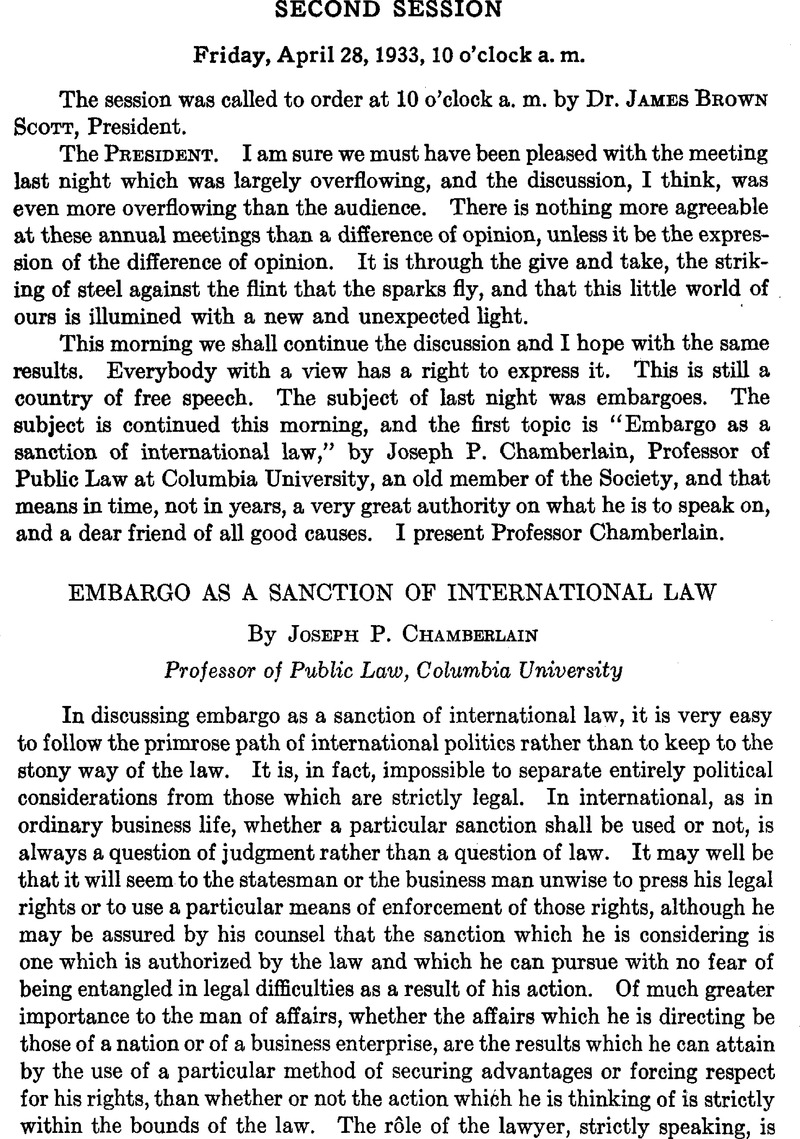No CrossRef data available.
Published online by Cambridge University Press: 27 February 2017

1 Charles Cheney Hyde, International Law, Vol. II, p. 182.
2 The project of the American Institute of International Law on “Measures of Self-redress Short of War” provides for embargo and non-intercourse, which is defined as: “Suspension of commercial intercourse with the country whose acts are the source of complaint, in order to secure a government and its citizens from treatment contrary to international law.” The embargo may either be pacific, which will only restrain the departure from the territory of the vessels of the country laying the embargo; or hostile, under which the ships or properties of a specified foreign nation are detained. Non-intercourse and pacific embargo are measures of a pacific, hostile embargo, of a coercive, nature. American Journal of International Law, Special Supplement, Vol. 20 (1926), p. 383.
3 Hyde, op. cit., p. 182; Hall, International Law, 8th ed. §13, p. 66; “The Boycott in Foreign Affairs,” by Charles Cheney Hyde and Louis B. Wehle. A. J. I. L., Vol. 27 (1933), p. 1.
4 Treaty between United States and Germany, Dee. 8, 1923. U. S. Treaty Series, No. 725; A. J. I. L., Supp., Vol. 20 (1926), p. 4.
5 Narcotic Import and Export Act. Code of Laws of U. S., Title 21, Ch. 6, §182.
6 39 Statutes at Large, 799.
7 Hall, op. cit., p. 434.
8 Oppenheim, International Law, 3rd ed., 1921, p. 400.
9 Mr. Lansing, Secretary of State, to Mr. Penfield, Ambassador to Austria-Hungary,
10 Moore, International Law Digest, Vol. VII, p. 142, §1098.
11 Brig Aurora, 7 Cranch, 382.
12 39 Statutes at Large, 799.
13 See “Practicable Sanctions,” by John Foster Dulles, in Boycotts and Peace, Report of the Committee on Economic Sanctions, Chap. 3, p. 17.
14 In the Alabama Claims Case: “The United States demanded compensation for the following classes of losses and expenditures, so far as they grew out of the acts of the cruisers, viz: 1. Direct losses growing out of the destruction of vessels and their cargoes.’ 2. The national expenditures in the pursuit of those cruisers.’ 3. The loss in the transfer of the American Commercial Marine to the British flag.’ 4. The enhanced payments of insurance.’ 5. The prolongation of the war, and the addition of a large sum to the cost of the war and the suppression of the rebellion.’ It was denied by Great Britain that a submission of all the claims to arbitration carried with it the right of the arbitrators to take into consideration all the elements of loss, and it was insisted that the tribunal had no right, under the terms of the treaty, to take classes three, four, and five into consideration in its estimate of damages. The United States denied this proposition, and contended that the tribunal was invested with power to decide the question of the extent of its jurisdiction. The tribunal, without deciding that question, held that these claims do not constitute, upon the principles of international law applicable to such cases, good foundation for an award of compensation or computation of damages between nations, and should, upon such principles, be wholly excluded from the consideration of the Tribunal, in making its award, even if there were no disagreement between the two Governments as to the competency of the Tribunal to decide thereon.’ And in regard to the second of the above items of loss, the Tribunal, in its award, decided thus: ’Whereas, so far as relates to the particulars of the indemnity claimed by the United States, the costs of pursuit of the Confederate cruisers are not, in the judgment of the Tribunal, properly distinguishable from the general expenses of the war, carried on by the United States: The Tribunal is therefore of opinion, by a majority of three to two voices, that there is no ground for awarding to the United States any sum by way of indemnity under this head”’ Moore, Digest, Vol. VI, p. 999.